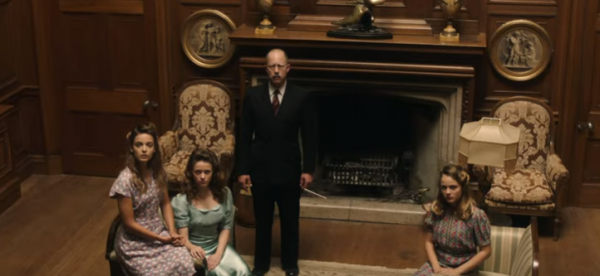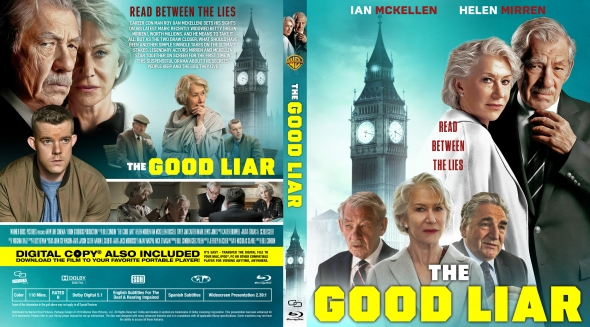“The Good Liar” (2019)

Introducing The Good Liar (2019): A Masterful Tale of Deception and Betrayal
Overview
The Good Liar, released on November 15, 2019, is a gripping psychological thriller directed by Bill Condon and adapted from Nicholas Searle’s 2016 novel of the same name. The film stars Ian McKellen and Helen Mirren in a battle of wits, portraying two complex characters whose seemingly straightforward relationship unravels into a web of lies, revenge, and shocking revelations. With its sophisticated storytelling, stellar performances, and a narrative that keeps audiences guessing, The Good Liar is a standout entry in the con-artist thriller genre, blending suspense with emotional depth. While not a major box office success, the film has been praised for its compelling leads and intricate plot twists, cementing its place as a sophisticated cinematic experience.

Plot Summary
Set in contemporary London, The Good Liar follows Roy Courtnay (Ian McKellen), a seasoned con artist who preys on wealthy individuals through elaborate scams. Roy, a charming but ruthless manipulator, sets his sights on Betty McLeish (Helen Mirren), a widowed Oxford professor with a substantial fortune. Posing as a retired gentleman seeking companionship, Roy meets Betty through an online dating site, and the two quickly form a connection. Betty, seemingly naive and trusting, invites Roy into her life, much to the suspicion of her grandson, Steven (Russell Tovey), who questions Roy’s intentions.
As Roy ingratiates himself with Betty, planning to swindle her out of her savings, the film reveals layers of deception. Roy’s schemes are complicated by his volatile partnership with Vincent (Jim Carter), his longtime accomplice, and encounters with other victims of his past cons. Meanwhile, Betty’s serene demeanor hides her own secrets, and as the narrative unfolds, the film delves into their shared history, revealing a connection rooted in a traumatic event from decades earlier. Without spoiling the film’s major twists, the story builds to a climactic confrontation that flips the dynamic between predator and prey, exposing the true extent of each character’s cunning.
The plot is driven by a series of revelations that challenge audience assumptions, culminating in a resolution that balances justice with moral ambiguity. The film’s pacing is deliberate, allowing tension to build as the layers of deceit are peeled back, making The Good Liar a rewarding experience for viewers who enjoy cerebral thrillers.

Themes and Symbolism
The Good Liar explores themes of deception, trust, and the long-lasting impact of past actions. At its core, the film is a study of manipulation, examining how charisma and lies can obscure truth, both in personal relationships and on a broader scale. Roy’s con artistry serves as a metaphor for the façades people construct, while Betty’s character challenges stereotypes about aging and vulnerability, revealing the strength beneath her seemingly passive exterior.
The film also delves into themes of revenge and justice, particularly through the lens of historical trauma. Without revealing spoilers, the narrative ties the characters’ present-day actions to events from World War II, exploring how guilt, betrayal, and retribution shape lives across decades. This historical backdrop adds depth to the thriller, grounding its twists in emotional stakes that resonate beyond the immediate plot.
Symbolically, the film uses settings like Betty’s cozy suburban home and London’s urban sprawl to contrast the illusion of safety with the reality of danger. The online dating platform that brings Roy and Betty together symbolizes modern vulnerabilities, where trust is easily exploited in the digital age. The film’s title itself, The Good Liar, is a playful nod to the ambiguity of truth, inviting viewers to question who the “good” liar is and whether deception can ever serve a moral purpose.

Cast and Performances
The Good Liar is elevated by the powerhouse performances of its leads, Ian McKellen and Helen Mirren. McKellen, known for roles in The Lord of the Rings and X-Men, delivers a captivating performance as Roy Courtnay, blending charm, menace, and vulnerability. His ability to shift from affable gentleman to cold-hearted schemer keeps audiences on edge, making Roy both repulsive and oddly compelling. Mirren, an Oscar winner for The Queen, is equally mesmerizing as Betty, portraying her with a quiet strength that hints at deeper complexities. Their chemistry is electric, with each actor playing off the other’s subtlety to create a dynamic that drives the film.
Supporting performances add depth to the narrative. Russell Tovey’s Steven is convincingly protective, serving as the audience’s lens into Roy’s suspicious behavior. Jim Carter, known for Downton Abbey, brings gravitas to Vincent, Roy’s conflicted accomplice, while smaller roles by Mark Lewis Jones and Jóhannes Haukur Jóhannesson as other figures from Roy’s past add to the film’s tension. The ensemble’s ability to balance understated drama with thriller elements enhances the film’s sophisticated tone.

Direction and Production
Directed by Bill Condon, who previously collaborated with McKellen on Gods and Monsters (1998) and Mr. Holmes (2015), The Good Liar showcases his knack for crafting character-driven thrillers. Condon’s direction emphasizes the psychological interplay between Roy and Betty, using close-ups and subtle visual cues to heighten suspense. The film’s pacing, while slow at times, serves to build anticipation for its major reveals, though some critics noted that the deliberate tempo might test less patient viewers.
The screenplay, adapted by Jeffrey Hatcher, stays faithful to the spirit of Nicholas Searle’s novel while streamlining certain elements for cinematic impact. The production, with a budget of $10 million, was shot primarily in London and Berlin, with locations chosen to reflect the contrast between Betty’s idyllic suburban life and Roy’s gritty underworld. Cinematographer Tobias A. Schliessler employs a muted color palette to evoke a sense of unease, while Carter Burwell’s score, blending orchestral and suspenseful tones, underscores the film’s shifting moods.
Production design by John Stevenson and costumes by Keith Madden contribute to the film’s authenticity, particularly in flashbacks that recreate mid-20th-century settings. The film’s use of historical elements was meticulously researched, ensuring that references to World War II and its aftermath felt credible. Despite its modest budget, the production achieves a polished look, leveraging its stellar cast and tight script to maximize impact.

Critical Reception
The Good Liar received mixed to positive reviews, earning a 63% approval rating on Rotten Tomatoes based on 187 reviews, with an average score of 6.2/10. The consensus praised the film for “the sheer fun of watching Ian McKellen and Helen Mirren’s dueling performances,” though some felt the plot’s twists were “unevenly executed.” Critics lauded the chemistry between McKellen and Mirren, with The New York Times calling their performances “a masterclass in subtlety and deception,” while Variety noted that the film’s “deliciously twisty” narrative kept audiences engaged.
However, some reviewers criticized the film for its pacing and reliance on genre conventions. The Guardian described it as “a touch too predictable,” arguing that the twists, while clever, didn’t always land with the intended impact. Box office performance was modest, with the film grossing $33.8 million worldwide against its $10 million budget, performing better internationally than domestically, where it opened to $5.6 million. The film’s niche appeal, targeting older audiences and fans of psychological thrillers, limited its mainstream success but ensured a dedicated following.

Cultural Impact and Legacy
The Good Liar occupies a unique space in the thriller genre, blending the cerebral deception of films like The Talented Mr. Ripley with the emotional weight of historical drama. Its focus on older protagonists—McKellen was 80 and Mirren 74 during filming—challenges ageist stereotypes in cinema, presenting complex, morally ambiguous characters who defy expectations. The film’s exploration of digital deception, through the lens of online dating, resonates with contemporary anxieties about trust in the internet age, while its historical elements connect to broader discussions about accountability and justice.
The film has been praised for showcasing McKellen and Mirren at the height of their powers, adding to their legacies as two of cinema’s most versatile performers. Its twists and morally complex ending have sparked debate among viewers, with some appreciating its ambiguity and others wishing for clearer resolutions. Available on platforms like HBO Max and for purchase on DVD and Blu-ray, The Good Liar has found a second life among fans of character-driven thrillers, particularly those who enjoy unraveling intricate narratives.
The film also contributed to discussions about adapting literary thrillers for the screen, with Searle’s novel providing a rich foundation for Condon’s vision. While not a cultural juggernaut, The Good Liar remains a compelling case study in how veteran actors and a tightly crafted story can elevate a modest production into a memorable cinematic experience.

Conclusion
The Good Liar (2019) is a sophisticated and engaging thriller that thrives on the electric performances of Ian McKellen and Helen Mirren. Directed by Bill Condon, the film weaves a complex tapestry of deception, revenge, and historical reckoning, keeping audiences guessing with its unpredictable twists. While its deliberate pacing and niche appeal may not suit all viewers, its exploration of trust, betrayal, and the enduring impact of the past makes it a rewarding watch. For fans of psychological thrillers, literary adaptations, or the magnetic chemistry of its leads, The Good Liar offers a captivating journey into a world where nothing is as it seems, and every lie carries a price.